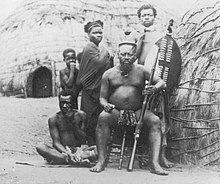Ntshingwayo kaMahole Khoza
| Ntshingwayo Khoza | |
|---|---|

One of only two photographs known to exist of Ntshingwayo kaMahole. Taken at his kraal during the First Anglo-Zulu War of 1879.
|
|
| Born | 1809 |
| Died | 21 July 1883 oNdini, Zululand |
| Allegiance | Zulu Kingdom |
| Rank | inDuna |
| Commands held | Zulu Army |
| Battles/wars | Anglo-Zulu War |
Ntshingwayo kaMahole of the Khoza (1809–1883) was the commanding general [isiZulu: inDuna] of King Cetshwayo's Zulu Army during the first Anglo-Zulu War. He became known as Ntshingwayo kaMahole after being taken into foster care by Mahole of the Khoza.
Ntshingwayo was given overall field command of the Zulu impi against the Centre Column of the first British invasion of Zululand in the Anglo-Zulu War of 1879. Despite conflicting orders - to meet the British Army's Centre Column in open battle "and eat them up" [kill them], but also a private command from Cetshwayo "not to go to the English at once [to attack], but to hold a conference first and send some chiefs to the English to ask why they were laying the country waste and killing Zulus", Ntshingwayo successfully outmanoeuvred Lt. Gen. Lord Chelmsford in the field. Chelmsford had split the British contingent, sending out a large part of his forces on patrols from the main British camp at Isandlwana in an effort to find the Zulu army, leaving the camp poorly defended and unfortified. Ntshingwayo's amabutho [isiZulu: "regiments"; singular: ibutho] attacked and virtually annihilated the encamped British Army in the Battle of Isandlwana on 22 January 1879. With a death toll of some 1,300 British troops, locally conscripted volunteers, native soldiers and camp followers, the British Army suffered the bloodiest defeat by a native force in its history and the worst defeat of the Victorian era.
Despite the overwhelming victory, and Ntshingwayo's competent command of the battle, the King was extremely displeased at the great number of Zulu casualties at Isandlwana. It will never be known how many casualties the Zulus suffered, but several hundred were killed and many more wounded. Modern historians suggest a total casualty figure of some 1,000 Zulus is not unreasonable. Two of Ntshingwayo's own sons who fought in the battle were badly wounded. Sishishili kaMnqandi, a royal favourite and an induna [isiZulu: "officer"] of the uKhandempemvu ibutho who the King had asked to report on the battle, placed the blame for the lack of the Zulu army's preparation and the resulting high death toll squarely at the door of Ntshingwayo, who forfeited much of the public acclaim he was due for his great victory. Yet the blame for the outcome is arguably King Cetshwayo's, since he gave conflicting orders to Ntshingwayo to not attack the British until after negotiations. In the event, the Zulu surprise was so complete that they had little choice but to engage the British where they found them on the field.
...
Wikipedia
